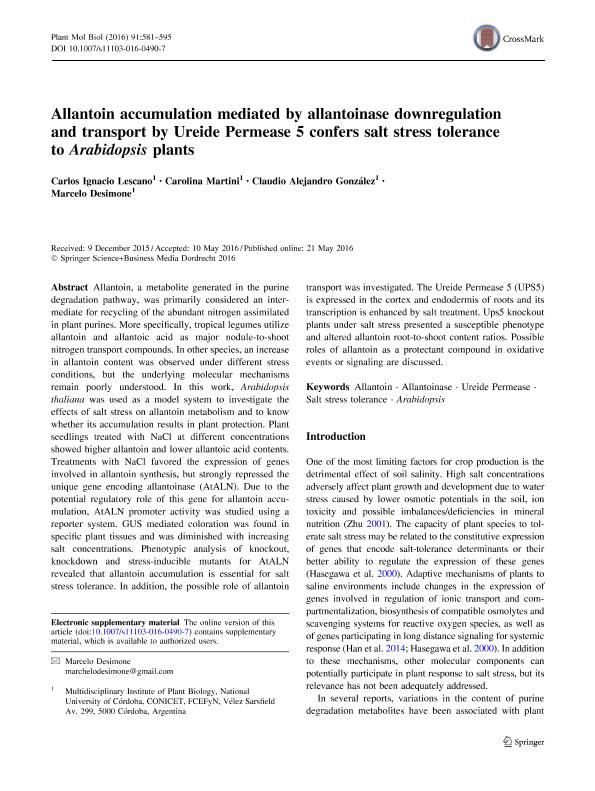Mostrar el registro sencillo del ítem
dc.contributor.author
Lescano López, Ignacio

dc.contributor.author
Martini, Carolina María

dc.contributor.author
González, Claudio Alejandro

dc.contributor.author
Desimone, Marcelo

dc.date.available
2017-06-08T15:20:58Z
dc.date.issued
2016-07
dc.identifier.citation
Lescano López, Ignacio; Martini, Carolina María; González, Claudio Alejandro; Desimone, Marcelo; Allantoin accumulation mediated by allantoinase downregulation and transport by Ureide Permease 5 confers salt stress tolerance to Arabidopsis plants; Springer; Plant Molecular Biology; 91; 4-5; 7-2016; 581-595
dc.identifier.issn
0167-4412
dc.identifier.uri
http://hdl.handle.net/11336/17763
dc.description.abstract
Allantoin, a metabolite generated in the purine degradation pathway, was primarily considered an intermediate for recycling of the abundant nitrogen assimilated in plant purines. More specifically, tropical legumes utilize allantoin and allantoic acid as major nodule-to-shoot nitrogen transport compounds. In other species, an increase in allantoin content was observed under different stress conditions, but the underlying molecular mechanisms remain poorly understood. In this work, Arabidopsis thaliana was used as a model system to investigate the effects of salt stress on allantoin metabolism and to know whether its accumulation results in plant protection. Plant seedlings treated with NaCl at different concentrations showed higher allantoin and lower allantoic acid contents. Treatments with NaCl favored the expression of genes involved in allantoin synthesis, but strongly repressed the unique gene encoding allantoinase (AtALN). Due to the potential regulatory role of this gene for allantoin accumulation, AtALN promoter activity was studied using a reporter system. GUS mediated coloration was found in specific plant tissues and was diminished with increasing salt concentrations. Phenotypic analysis of knockout, knockdown and stress-inducible mutants for AtALN revealed that allantoin accumulation is essential for salt stress tolerance. In addition, the possible role of allantoin transport was investigated. The Ureide Permease 5 (UPS5) is expressed in the cortex and endodermis of roots and its transcription is enhanced by salt treatment. Ups5 knockout plants under salt stress presented a susceptible phenotype and altered allantoin root-to-shoot content ratios. Possible roles of allantoin as a protectant compound in oxidative events or signaling are discussed.
dc.format
application/pdf
dc.language.iso
eng
dc.publisher
Springer

dc.relation
http://hdl.handle.net/11336/78915
dc.rights
info:eu-repo/semantics/openAccess
dc.rights.uri
https://creativecommons.org/licenses/by-nc-sa/2.5/ar/
dc.subject
ALLANTOIN
dc.subject
ALLANTOINASE
dc.subject
ARABIDOPSIS
dc.subject
SALT STRESS TOLERANCE
dc.subject
UREIDE PERMEASE
dc.subject.classification
Bioquímica y Biología Molecular

dc.subject.classification
Ciencias Biológicas

dc.subject.classification
CIENCIAS NATURALES Y EXACTAS

dc.title
Allantoin accumulation mediated by allantoinase downregulation and transport by Ureide Permease 5 confers salt stress tolerance to Arabidopsis plants
dc.type
info:eu-repo/semantics/article
dc.type
info:ar-repo/semantics/artículo
dc.type
info:eu-repo/semantics/publishedVersion
dc.date.updated
2017-06-06T14:42:40Z
dc.journal.volume
91
dc.journal.number
4-5
dc.journal.pagination
581-595
dc.journal.pais
Alemania

dc.journal.ciudad
Berlín
dc.description.fil
Fil: Lescano López, Ignacio. Consejo Nacional de Investigaciones Científicas y Técnicas. Centro Científico Tecnológico Conicet - Córdoba. Instituto Multidisciplinario de Biología Vegetal. Universidad Nacional de Córdoba. Facultad de Ciencias Exactas Físicas y Naturales. Instituto Multidisciplinario de Biología Vegetal; Argentina
dc.description.fil
Fil: Martini, Carolina María. Consejo Nacional de Investigaciones Científicas y Técnicas. Centro Científico Tecnológico Conicet - Córdoba. Instituto Multidisciplinario de Biología Vegetal. Universidad Nacional de Córdoba. Facultad de Ciencias Exactas Físicas y Naturales. Instituto Multidisciplinario de Biología Vegetal; Argentina
dc.description.fil
Fil: González, Claudio Alejandro. Consejo Nacional de Investigaciones Científicas y Técnicas. Centro Científico Tecnológico Conicet - Córdoba. Instituto Multidisciplinario de Biología Vegetal. Universidad Nacional de Córdoba. Facultad de Ciencias Exactas Físicas y Naturales. Instituto Multidisciplinario de Biología Vegetal; Argentina
dc.description.fil
Fil: Desimone, Marcelo. Consejo Nacional de Investigaciones Científicas y Técnicas. Centro Científico Tecnológico Conicet - Córdoba. Instituto Multidisciplinario de Biología Vegetal. Universidad Nacional de Córdoba. Facultad de Ciencias Exactas Físicas y Naturales. Instituto Multidisciplinario de Biología Vegetal; Argentina
dc.journal.title
Plant Molecular Biology

dc.relation.alternativeid
info:eu-repo/semantics/altIdentifier/url/http://link.springer.com/article/10.1007/s11103-016-0490-7
dc.relation.alternativeid
info:eu-repo/semantics/altIdentifier/doi/http://dx.doi.org/10.1007/s11103-016-0490-7
Archivos asociados
